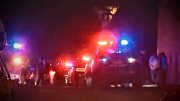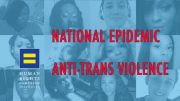December 2, 2010
by Tynan Power*/Special to TRT
On Sunday, November 21st, over 60 people created a living luminary as they walked quietly through downtown Northampton. Every year since 1999, Transgender Day of Remembrance (TDOR) has marked the loss of numerous innocent victims to violence sparked by intolerance of anyone who dares step outside of society’s gender norms. Held in November to honor the memory of Rita Hester, a trans woman murdered on November 28, 1998 in the Boston area, it has become a local tradition to see people bundled up against the chill during evening candle-lit vigils and listening to a somber reading of the names of those who have died in the past year.
This year, Yohah Ralph and I organized the Northampton Transgender Day of Remembrance event to bring together the transgender community in a spirit of unity, after a tough year in which it experienced some “growing pains.”
“I helped to organize the TDOR because I am interested in bringing people together to share our faith, aspirations, and hope for the world, and to foster supportive and meaningful relationships,” Ralph said. “My training as a minister helped me with creating programs and community organizing, and it was a good fit for creating an event like TDOR.
Musicians, artists, and writers offer us new vantage points to encounter the world, and I really enjoy creating space where we can express ourselves and be enriched by one another.”
The evening offered opportunities for many in the community to bring their talents. Speakers included Jasmina Andino, of Connecticut, who was First Alternate at 2010’s Miss Trans New England pageant.
“I choose to speak because of all the trans girls murdered in Puerto Rico this year, and for all the teens in the GLBT community who took their lives,” said Andino.
Other speakers included Karen Johnston, a local queer-identified lay preacher, poet and social worker, who read her poem “Let the Foul Harpies Starve”; comedian Tammy Twotone, who offered a message entitled “Hope;” and Mary Beth Silva, who read “Children Learn What They Live.”
Two area musicians shared their talents, as well.
“I chose to sing ‘How Could Anyone Ever Tell You’ by Libby Roderick, because just about everyone in the GLBTIQ community has been told (by family, peers, politicians, preachers, media, and people on the street) that we are ugly, broken, immoral, and unlovable,” said folk and word performer, Arjuna Greist. “This song brings out the shining truth that we are, every one of us, beautiful, whole, and connected by love. We need to give this message to each other often, to counteract the hate. I followed this with “Jerry in Heaven, “which I wrote as a spiritual challenge to forgive one of the biggest bullies of modern times, Jerry Falwell. Violence springs from hatred, which springs from fear. If we address the fear with compassion and forgiveness, there is a chance of breaking the cycle.”
Rocker Lezleeanne Rios injected her characteristic energy into the evening.
“‘Sister, sister’ is about violence against women and encouraging my ‘Sisters’ to change their life and step out of all that,” Rios said. “’Teach me Peace’ is about my own and other’s successful struggle to find peace in spite of a life of abuse.”
When it came time to remember the dead, a hat was passed containing names and brief information about the circumstances of each death. Attendees rose and read the names, one by one, and then sat for a moment of silence.
Some of the victims of violence each year are transgender men and women, some are genderqueer-people between or beyond the binary identities of man and woman-and some victims simply expressed themselves in a way that made someone else feel uncomfortable. This year, one of the 30 names listed on the TransgenderDOR.org website that compiles data for the Trans Day of Remembrance was a 16-month-old boy-far too young to articulate his gender identity-named Roy Antonio Jones III, of Southampton, NY. He died at the hands of his mother’s boyfriend, supposedly because he didn’t “act like a boy.”
Jones exemplified a theme in this year’s Day of Remembrance, at least in Northampton: we can’t neglect to recognize victims in the wider community, especially when they lose their lives due to bigotry around gender identity, gender expression, or sexual orientation. As different as the issues of gender identity and sexual orientation may be, discrimination and violence often don’t differentiate. Fatal attacks on trans women of color-the most common victims-don’t begin with an inquiry about their sexual and gender identities, just as bullying that targets young lesbian and gay students is often directed at those whose gender expression makes it hard for them to “pass” as straight.
Because of this interconnection of bias and oppression, this year, in Northampton, we remembered all the transgender lives lost-and we also honored the memories of the LGBT youth lost to suicide in the past few months.
When we consider the lives lost to violence and the suicides that seemed to often end lives of unspoken despair, we have to ask: where were the loved ones, the friends, the allies, the communities-in these moments of fear and despair?
With that in mind, I took the opportunity of giving closing words to ask those gathered to share in the responsibility for our community-both our trans community and our wider LGBT community. I suggested that we look beyond our chosen family-and, perhaps, our comfort zones-to commit to getting to know and supporting someone else, so that we don’t have toask where help was for any of our own, next year.
“It is important to remember those lost to transphobic and homophobic violence,” said Arjuna Greist. “Both to honor their individual lives and to inspire us all to keep working to make a better, more just world where the list of names dwindles down to none.”






